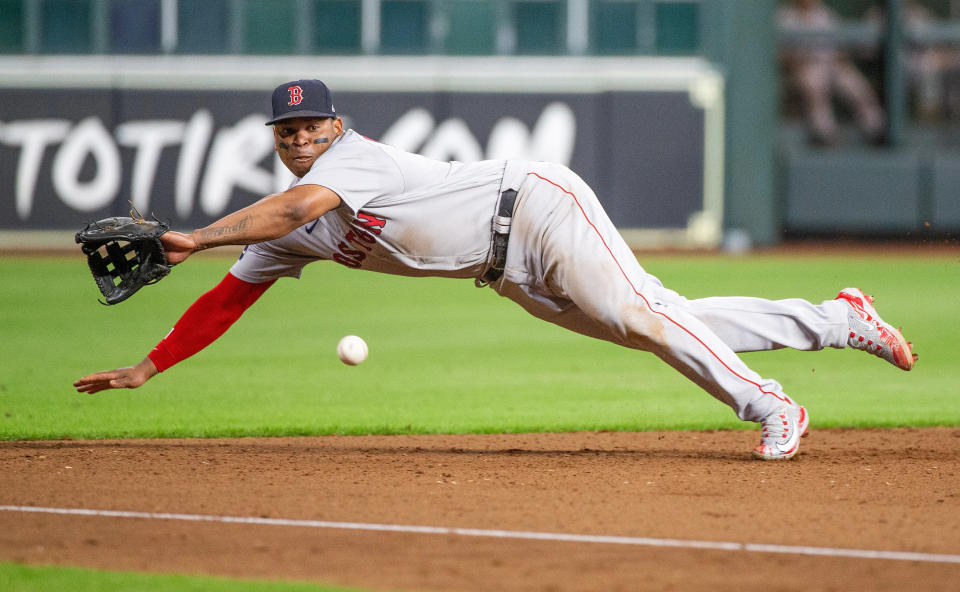The Red Sox have a Rafael Devers problem, with no clear solution

The Red Sox have a Rafael Devers problem, with no clear solution originally appeared on NBC Sports Boston
The nightmare scenario unfolding for the Red Sox has nothing to do with missing the playoffs. It’s Rafael Devers.
The Red Sox are paying Devers to be the centerpiece of their organization, but he instead looks broken. He has reverted to a defensive disaster, which merely obscures his inconsistency on offense, where he’s on pace for a rather ho-hum 30-100 season.
With Mookie Betts returning to Fenway on Friday for the first time since the 2020 trade that shifted the hopes of the organization from an established star to one on the ascent, it’s fair to question the future of their $313 million investment.
If there’s a moment that crystallizes the dangers of betting on Devers, it came in Tuesday’s loss to the Astros. Devers had already booted one ball at third base that preceded a two-run homer, and now Tanner Houck was in further trouble with two on and two outs, one of those baserunners the result of an errant Devers throw.
Pitching coach Dave Bush visited the mound, and the rest of the infield joined him, save for one conspicuous absence. Devers, who wears his failures like an itchy dress shirt on student picture day, never left his crouch at third base, draping his glove over his face in shame. He’d later bury his head in his hands in the dugout.
Were it an isolated incident or just a bad day, no one would care. But we’re going on six years of this. Devers once again leads American League third baseman in errors. Assuming it stays that way, he’ll extend his record of six straight years atop that ignominious leaderboard. No one else has done it more than four consecutively, and the last two three-time winners – Pittsburgh’s Pedro Alvarez and Cincinnati’s Tony Perez – ended up switching positions.
That’s not a great option for Devers, not with rookie Triston Casas manning first base, which means the Red Sox could soon be paying $300 million for a DH. Even Devers’s most ardent defenders knew he wouldn’t stay at third forever, but they were definitely banking on more than a year, especially since there are already multiple DH candidates on the roster in incumbent Justin Turner and left fielder Masataka Yoshida, not to mention Casas.
The alternative to DHing Devers is allowing him to continue to torpedo the team’s infield defense, which feels untenable. He ranks at the bottom of the league in most of the advanced defensive metrics, too. No one questions how hard he works at it, but he’s a well-established liability.
That’s only half the problem. Offensively, Devers certainly flashes, like a 9-for-13, two-homer weekend in the Bronx, but he’s not the impossible out we often portray him as when he golfs a bad-ball homer. Throw out the pandemic-shortened 2020, and Devers’ OPS has declined in four straight seasons, starting with a high of .916 in 2019. He’s obviously a really good hitter, but the Red Sox are paying him to be great, and he consistently falls short of that measure.

The Red Sox, in fact, may have been on to something when they compared him to Atlanta’s Matt Olson, who signed with the Braves for eight years and $168 million prior to last season. All Olson has done this year is smash an NL-leading 43 homers while emerging as a legitimate MVP candidate. Perhaps that comp wasn’t so offensive after all.
The same goes for his teammate, third baseman Austin Riley, who hits the ball just as hard and as far as Devers, but is six months younger and making $120 million less. He’s also an above-average third baseman. There should be no question which player you’d objectively rather have right now.
The Red Sox need Devers to be a superstar in the mold of Seattle’s Julio Rodriguez, who has put that team on his back. The reigning Rookie of the Year got off to a slow start, but his monster August has coincided with Seattle vaulting not only into the third wild card, but suddenly challenging the Rangers and Astros for first place in the AL West. It’s easy to see the five-tool Rodriguez annually contending for MVP awards as he matures. It’s entirely possible, conversely, that we’ll look back at Devers’ 2019 season at age 22 as his best.
Meanwhile, the Red Sox continue to treat Devers like he’s some promising rookie and not an established All-Star. Manager Alex Cora has a habit of referring to Devers as “this kid,” but we’re talking about a seven-year veteran who turns 27 in the fall. His combination of salary and experience should end his habit of deferring to veterans in much the way that former teammate Xander Bogaerts made the Red Sox his own at age 26 in 2019, but it hasn’t happened yet. Instead, Devers is the guy needing to be consoled after another errant throw.
This should all add up to some serious uneasiness for the Red Sox front office. They bet big on Devers in part because there was no one else left. They’ve staked their futures on a flawed player whose deficiencies no longer feel temporary.
